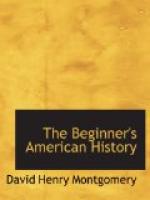Some years after this the Indian maiden married John Rolfe, an Englishman who had come to Virginia. They went to London, and Pocahontas died not far from that city. She left a son; from that son came some noted Virginians. One of them was John Randolph. He was a famous man in his day, and he always spoke with pride of the Indian princess, as he called her.
[Footnote 5: Pocahontas (Po-ka-hon’tas).]
[Footnote 6: Rolfe (Rolf).]
[Footnote 7: On Pocahontas, see List of Books at the end of this book.]
43. Captain Smith is made governor of Jamestown; the gold-diggers; “Corn, or your life.”—More emigrants came over from England, and Captain Smith was now made governor of Jamestown. Some of the emigrants found some glittering earth which they thought was gold. Soon nearly every one was hard at work digging it. Smith laughed at them; but they insisted on loading a ship with the worthless stuff and sending it to London. That was the last that was heard of it.
The people had wasted their time digging this shining dirt when they should have been hoeing their gardens. Soon they began to be in great want of food. The captain started off with a party of men to buy corn of the Indians. The Indians contrived a cunning plot to kill the whole party. Smith luckily found it out; seizing the chief by the hair, he pressed the muzzle of a pistol against his heart and gave him his choice,—“Corn, or your life!” He got the corn, and plenty of it.
[Illustration: “Corn, or your life!”]
44. “He who will not work shall not eat.”—Captain Smith then set part of the men to planting corn, so that they might raise what they needed. The rest of the settlers he took with him into the woods to chop down trees and saw them into boards to send to England. Many tried to escape from this labor; but Smith said, Men who are able to dig for gold are able to chop; then he made this rule: “He who will not work shall not eat.” Rather than lose his dinner, the laziest man now took his axe and set off for the woods.
45. Captain Smith’s cold-water cure.—But though the choppers worked, they grumbled. They liked to see the chips fly and to hear the great trees “thunder as they fell,” but the axe-handles raised blisters on their fingers. These blisters made the men swear, so that often one would hear an oath for every stroke of the axe. Smith said the swearing must be stopped. He had each man’s oaths set down in a book. When the day’s work was done, every offender was called up; his oaths were counted; then he was told to hold up his right hand, and a can of cold water was poured down his sleeve for each oath. This new style of water cure did wonders; in a short time not an oath was heard: it was just chop, chop, chop, and the madder the men got, the more the chips would fly.
46. Captain Smith meets with an accident and goes back to England; his return to America; his death.—Captain Smith had not been governor very long when he met with a terrible accident. He was out in a boat, and a bag of gunpowder he had with him exploded. He was so badly hurt that he had to go back to England to get proper treatment for his wounds.




